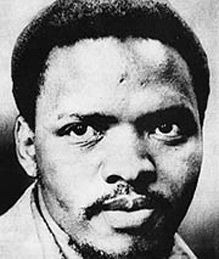*Image Credit: Wikipedia Three weeks after being arrested for acts of terrorism against the apartheid government of South Africa, activist Steve Biko lay dead in a Pretoria prison, the victim of intense torture by two security police. Famous around the world for his protests against the white-minority administration policy of suppressing black South Africans, Biko’s death brought global attention to the plight of the oppressed — particularly after the police officers were absolved of any guilt the following year. Born in King William’s Town, South Africa, Biko would eventually attend the University of Natal in eastern South Africa. While attending classes in anticipation of a medical degree, Biko got involved with the National Union of South African Students, an organization dedicated to the elimination of racist and sexist policies within the apartheid government. As he became more involved, Biko realized that colored students — black, Indian and so on — required a group targeting policies which would affect them more directly. Working with several others, he soon was president of the South African Students’ Organization (SASO), a political action group designed to help students develop “black consciousness.” With the destruction of the African National Congress after its leaders were imprisoned throughout the late 1950s and early 1960s, SASO soon evolved into the primary means of expression for black frustration. Joining with other groups in search of a similar awakening of the South African majority, the Black Consciousness Movement (BCM) was formed to uplift black South Africans and erode the “condescending” values of the white minority. Gaining a modicum of fame for his beliefs and the protests he participated in, Biko found himself expelled from the University of Natal in 1972. The following year, the apartheid government banned Biko from speaking to more than one person at a time or delivering a speech in public areas of King William’s Town, going so far as to forbid him from engaging the press in any form. Required to stay within his home province of Eastern Cape, Biko went to work connecting local movements and helping disenfranchised residents unite with one voice to protect their interests — the Njwaxa Leather-Works Project being just one example. Though his movements were restricted by the government, Biko managed to stay in touch with members of the BCM and other like-minded individuals throughout South Africa. In helping to coordinate the Soweto Uprising in the slums of Johannesburg during June 1976, he pushed himself near the top of the target list for the South African government. Having demonstrated the willingness to use force on the children of Soweto, it was only a matter of time before police made sure Biko was on the receiving end of violence. In mid-August 1977, South African officials finally nabbed their man. Pulled aside in a checkpoint and informed he had been in violation of Terrorism Act No. 83 of 1967, Biko was arrested and taken to the Port Elizabeth police station for questioning. After 22 hours of intense interrogation and severe beatings, Biko lay on the floor of Police Room 619 in a coma. Three weeks later, on September 11, he was loaded into the back of a sport utility vehicle for transportation to a jail Pretoria. Shortly after he arrived at the facility, naked and handcuffed, Biko died of his injuries early in the morning of September 12, 1977. As word spread like wildfire in the following days, government officials issued a statement blaming Biko’s death on the culmination of a hunger strike. When an autopsy revealed bruising and abrasions on the head, not to mention hemorrhaging within the skull, police again shifted course and told the press Biko had attempted suicide. Within weeks, journalists Helen Zile and Donald Woods revealed the nature of Biko’s treatment in the Port Elizabeth jail, galvanizing the BCM to continue the struggle. Today, he is regarded as one of the preeminent figures in the history of the unified South Africa.
September 12, 1977 CE – Anti-Apartheid Activist Steve Biko is Killed in Prison

